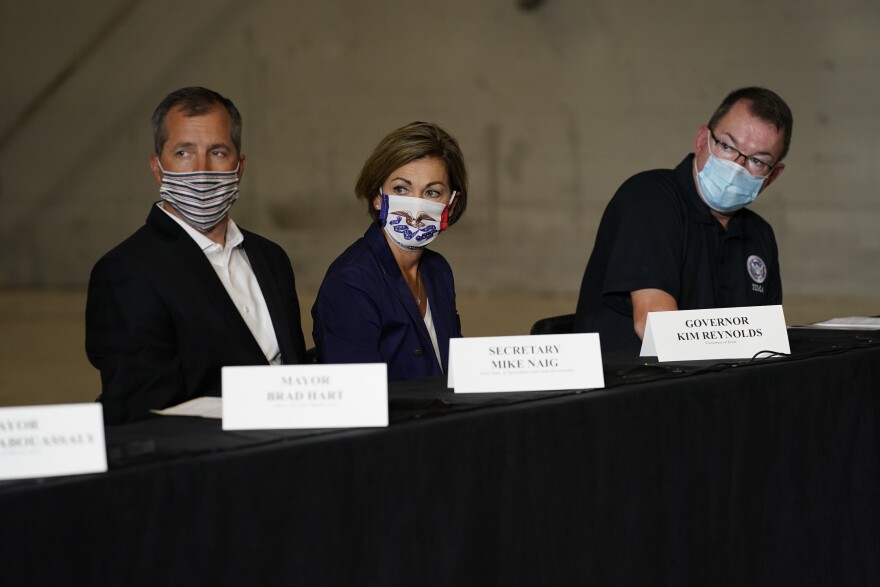After getting a briefing from state and local officials on the rare and powerful derecho, President Donald Trump says he will approve further federal aid for Iowans for storm damage he didn’t see firsthand.
Trump committed to approving individual assistance to Iowans during a meeting with local leaders in storm-ravaged Cedar Rapids on Tuesday. On Monday, Trump had wrongly asserted he had approved Iowa’s full request for nearly $4 billion in disaster aid.
In fact, he had omitted the individual assistance component of the major presidential disaster declaration request.
Posing questions to Gov. Kim Reynolds and Sens. Chuck Grassley and Joni Ernst, Trump seemed particularly concerned about how the storm impacted Iowa’s agriculture industry and crop yields.
“Can you find usage in some of the corn? Is it aged enough? Or is it just really not going to be able to be used?” Trump asked.
“It’ll depend,” replied Iowa Secretary of Agriculture Mike Naig. “There are millions of acres of corn that flat out won’t be able to be harvested.”
Cedar Rapids Mayor Brad Hart pointed the conversation towards the need for individual assistance, noting that tens of thousands of homes have been impacted by the storm, and many Iowans cannot afford the unexpected expense of reconstruction.
“Almost every one of our almost 60,000 homes and businesses, had some kind of damage. That's how widespread it was,” Hart said.
Yet at one point, Trump seemed to indicate he was not familiar with the request for individual assistance, which his office had not included in his initial approval.
“Adding the individual assistance component to the disaster declaration would really help so many people get those trees out of their yard and not have such a financial burden for them,” Hart said. “I can handle that, but there are so many Iowans cannot. So that would be a big help.”
“Alright good, we’ll take care of that,” Trump said. Turning to Reynolds he asked, “You know about that?”

“It’s actually part of the disaster and the declaration and we’re actually accumulating the damage and the numbers and we’ll be able to add that on,” Reynolds explained. “And we should be able to do that in a short amount of time.”
The federal funds could help support tens of thousands of Iowans in Cedar Rapids alone, Hart said.
“I think it could affect 55,000 people, at least. Because 55,000 buildings…homes, mainly homes, and businesses were affected by that,” Hart said.
“Amazing. That's bleak, hmm? That's amazing,” Trump responded. “Ok! We'll take care of it, mayor.”
When Trump was on the ground in Cedar Rapids, he did not tour any of the destruction firsthand but instead looked at photos at a meeting with local leaders.
Kim Reem, Executive Director of the Cedar Rapids-based non-profit Mission of Hope hammered home the message to the president that the derecho has left many Iowans struggling mightily to meet even their most basic needs.
“They’re hungry today. It’s day nine without power,” Reem said. “They’re not just hungry for food, they’re hungry for compassion from our leaders, just to know that our leaders care and are working on their behalf."
With some families having resorted to living in tents or cars, and many having struggled to access food, insulin, oxygen and diapers, officials in the state have compared the devastation to Hurricane Katrina.





